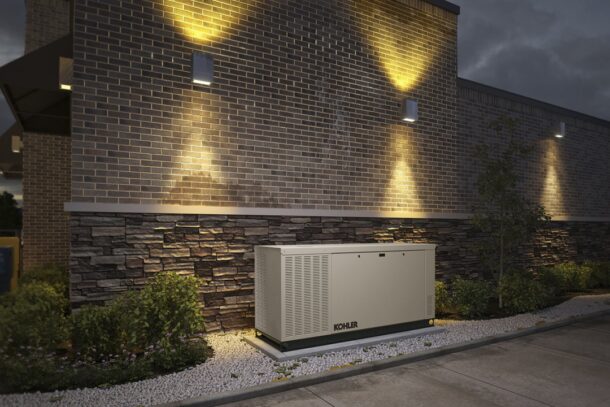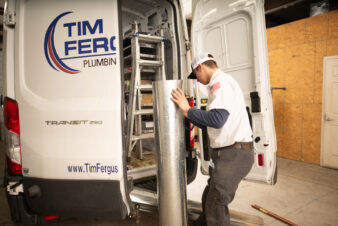Commercial construction professionals can rely on propane for lower emissions, enhanced resiliency
Unplanned outages have become increasingly commonplace as the U.S. demands more electricity from a century-old grid. In fact, the United States endures more blackouts than any other developed nation. And according to federal databases at the Department of Energy (DOE) and the North American Electric Reliability Corporation (NERC), the number of U.S. outages lasting more than an hour has risen steadily over the past decade.
A recent article in the Washington Post shows that more than 40 percent of the U.S. population reside in counties that experienced extreme weather events in 2021. As contractors continue integrating backup power, propane should be considered as the energy source to keep buildings operating clean and keeping emissions reduced. Sales of diesel generators have significantly increased due to electric grid disturbances, exacerbating local air quality concerns.
A new study from the Propane Education & Research Council (PERC) emphasizes the need to accelerate decarbonization today with clean energy sources like propane as diesel generators can negate emissions reduction efforts. The analysis, Power Generation: The Emissions Shifting Problem, examines recent power generation trends and how propane systems can offer a resilient, low-emissions solution for commercial construction professionals and their customers.

The Emissions Shifting Problem
Whether planned or unplanned, power outages can happen at any time. In response to the increase in outages, there’s been a spike in generator sales and use. A significant rise in backup generator sales is seen in storm-wrecked coastal areas, inland tornado alleys, and particularly in places like California. This spike in both sales and use is primarily of power generation solutions that are diesel-powered, which is creating a bigger emissions problem and degradation of local air quality.
Propane power generation equipment, including backup generators and combined heat and power systems (CHP), can help businesses be safer and more resilient, avoid economic losses, and reduce emissions. This loss of power to commercial buildings can impact vital systems like smoke and fire detection, elevators, refrigeration units, heating and cooling equipment, health and safety equipment, communications, and many other applications. Propane backup generation insulates companies from these economic losses.
According to PERC’s data, compared to diesel, propane significantly improves local air quality by mitigating nitrogen oxides and particulate matter, both of which are known health hazards. Propane also emits significantly less carbon dioxide and criteria pollutants than diesel-powered generators. In fact, according to the U.S. Energy Information Administration (EIA), propane is 16 percent cleaner than diesel when it comes to carbon dioxide (CO2) per unit of energy. CHP systems offer both power and heat (and/or cooling), while significantly reducing nitrogen oxides, particulate matter, and carbon dioxide emissions compared to units using diesel. Propane-powered systems can reduce CO2 emissions by more than 40 percent depending on the size of the unit, according to PERC’s research.
Propane power generation solutions are already creating opportunities for commercial construction professionals to reduce emissions compared with diesel, but as more renewable propane becomes available, propane solutions will become even cleaner. Renewable propane is made from a mix of waste residues and sustainably sourced materials—including agricultural waste products, cooking oil, and meat fats. Because it’s produced from renewable feedstocks, renewable propane is even cleaner than conventional propane—and far cleaner than other energy options. Renewable propane’s chemical structure and physical properties are the same as conventional propane, which means it can be used for all the same applications without any modifications to engines or equipment. In California, the propane industry has pledged 100 percent renewable sourcing by 2030. In PERC’s analysis, it found that renewable propane can lead to at least a 50-70 percent reduction in lifecycle CO2 emissions compared to conventional diesel and can accelerate deep decarbonization. It also found that blends of conventional and renewable propane are additional practical solutions for accelerating decarbonization.
Propane is a reliable energy source
Propane is a stable, portable energy source that can help support Americans when the grid goes down, ensuring continuous operations. Propane does not degrade like diesel, which means when the generator needs to start, it will. Propane does not oxidize, and it won’t varnish or gum a generator engine’s fuel system. For added resiliency, CHP solutions are a perfect fit for commercial and industrial applications, providing not only much needed electricity but also heat and/or hot water (and/or cooling) during power outages. When used in CHP mode, these solutions can be more than 90 percent efficient when converting fuel to electricity and useful heat.
Propane-powered backup generators ultimately provide peace of mind, especially for commercial operations where refrigeration for cold storage needs or other inventory protections that can fail if utility power is interrupted. Propane is an affordable energy choice capable of delivering efficient, on-site energy during power outages. Replacing diesel assets with propane-powered equipment will continue to push us toward significant air quality improvements and decarbonization.
To see more of PERC’s research supporting the benefits of using propane-powered back-up generators, visit Propane.com/Research.
 Bryan Cordill is the director of residential and commercial business development at the Propane Education & Research Council. He can be reached at bryan.cordill@propane.com.
Bryan Cordill is the director of residential and commercial business development at the Propane Education & Research Council. He can be reached at bryan.cordill@propane.com.




Join the conversation: